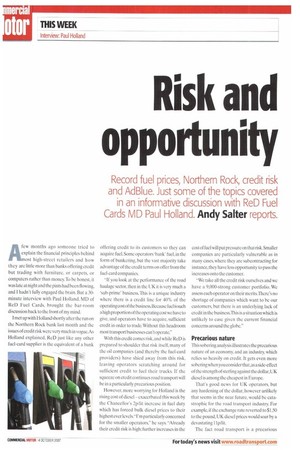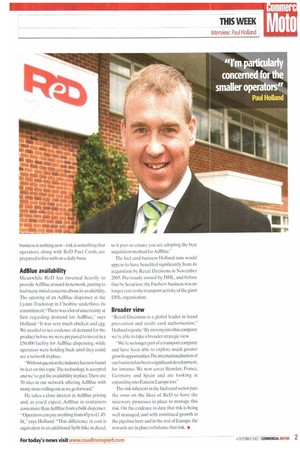Risk and opportunity
Page 22

Page 23

If you've noticed an error in this article please click here to report it so we can fix it.
Record fuel prices, Northern Rock, credit risk and AdBlue. Just some of the topics covered in an informative discussion with ReD Fuel Cards MD Paul Holland. Andy Salter reports.
Amfew months ago someone tried to explain the financial principles behind ost high-street retailers and how they are little more than banks offering credit but trading with furniture, or carpets, or computers rather than money. To be honest, it was late at night and the pints had been flowing, and I hadn't fully engaged the brain. But a 30minute interview with Paul Holland. MD of ReD Fuel Cards, brought the bar-room discussion back to the front of my mind.
I met up with Holland shortly after the run on the Northern Rock bank last month and the issues of credit risk were very much in vogue.As Holland explained, ReD just like any other fuel-card supplier is the equivalent of a bank offering credit to its customers so they can acquire fuel. Some operators 'bank' fuel, in the form of bunkering, but the vast majority take advantage of the credit terms on offer from the fuel-card companies.
"If you look at the performance of the mad haulage sector, then in the UK it is very much a 'sub-prime' business. This is a unique industry where there is a credit line for 40% of the operating cost of the business. Because fuel is such a high proportion of the operating cost we have to give, and operators have to acquire, sufficient credit in order to trade. Without this headroom most transport businesses can't operate."
With this credit comes risk.and while ReD is prepared to shoulder that risk itself, many of the oil companies (and thereby the fuel-card providers) have shied away from this risk, leaving operators scratching around for sufficient credit to fuel their trucks. If the squeeze on credit continues road transport will be in a particularly precarious position.
However, more worrying for Holland is the rising cost of diesel exacerbated this week by the Chancellor's 2p/lit increase in fuel duty which has forced bulk diesel prices to their highest ever levels.-I'm particularly concerned for the smaller operators," he says. "Already their credit risk is high; further increases in the cost of fuel will put pressure on that risk.Smaller companies are particularly vulnerable as in many cases, where they are subcontracting for instance, they have less opportunity to pass the increases onto the customer.
"We take all the credit risk ourselves and we have a 9,000-strong customer portfolio. We assess each operator on their merits:there's no shortage of companies which want to be our customers, but there is an underlying lack of credit in the business:This is a situation which is unlikely to ease given the current financial concerns around the globe."
Precarious nature
This sobering analysis illustrates the precarious nature of an economy, and an industry, which relies so heavily on credit. It gets even more sobering when you consider that,as aside-effect of the strength of sterling against the dollar, UK diesel is among the cheapest in Europe.
That's good news for UK operators, but any hardening of the dollar, however unlikely that seems in the near future. would be catastrophic for the road transport industry. For example, if the exchange rate reverted to $1.50 to the pound, UK diesel prices would soar by a devastating lip/lit.
The fact road transport is a precarious business is nothing new is something that operators. along with ReD Fuel Cards, arc prepared to live with on a daily basis.
AdBlue availability Meanwhile ReD has invested heavily to provide AdBlue around its network, putting to bed many initial concerns about its availabilitv. The opening of an AdBlue dispenser at the Lynun Truckstop in Cheshire underlines its commitment:"There was a lot of uncertainty at first regarding demand for AdBlue," says Holland. "It was very much chicken and egg. We needed to see evidence of demand for the product before we were prepared to invest in a £50,000 facility for AdBlue dispensing, while operators were holding back until they could see a network in place.
"Without question the industry has now found its feet on this topic.'lbe technology is accepted and we've got the availability in place.There are 50 sites in our network offering AdBlue with many more rolling out as we go forward."
He takes a close interest in AdBlue pricing and, as you'd expect. AdBlue in containers costs more than AdBlue from a bulk dispenser. "Operators can pay anything from 45p to £1.45/ lit," says Holland. That difference in cost is equivalent to an additional 5p/lit hike in diesel, so it pays to ensure you are adopting the best acquisition method for AdBlue."
The fuel card business Holland runs would appear to have benefited significantly from its acquisition by Retail Decisions in November 2005. Previously owned by DHL, and before that by Securicor. the Fuelserv business was no longer core to the transport activity of the giant OHL organisation.
Broader view -Retail Decisions is a global leader in fraud prevention and credit card authorisation," Holland reports."By moving into this company we're able to take a broader strategic view.
"We're no longer part of a transport company and have been able to explore much greater growth opportunities.The internationalisation of our business has been a significant development, for instance. We now cover Benelux, France, Germany and Spain and are looking at expanding into Eastern Europe too."
The risk inherent in the fuel-card sector puts the onus on the likes of ReD to have the necessary processes in place to manage this risk. On the evidence to date that risk is being well managed, and with continued growth in the pipeline here and in the rest of Europe, the rewards are in place to balance that risk. •


























































































































































































